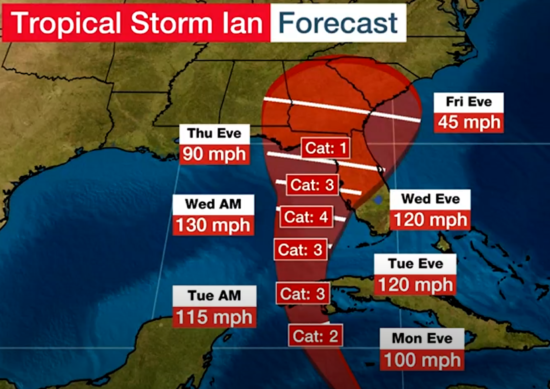Fighting fungus with metal, the only leg exercise you need, viruses that watch, and more
27 Sep 2022
Posted by Andrew Kantor
They watch and wait
If you always feel like somebody’s watching you, you’re either listening to ’80s music … or it’s the viruses inside you.
Viruses can only infect cells at certain times — when those cells produce appendages called pili and flagella. So (found Canadian microbiologists) the viruses sit inside already-infected cells, watching and waiting until they sense a protein called CtrA, which means nearby bacteria have grown those appendages. Then the viruses burst out like guests at a really bad surprise party.
Your brewery adventure awaits!
Employee pharmacists: Come join your fellow Academy of Employee Pharmacists members (and students! and friends!) at Atlanta’s amazing Monday Night Brewing for an afternoon of fun, beer, snacks, and comradery!
We didn’t bother with a cool name, so we just call it…

The whole shebang is just $10 — which even includes two drink tickets. What a deal!
The details
It’s on Saturday, October 22, from 3:00 – 6:00 PM.
It’s at Monday Night Brewing‘s Hop Hut Lounge: 670 Trabert Avenue, Atlanta (map).
(You can check out GPhA.org/mondaynight for a few more details — but really, what more do you need to know?)
Covid notes
Here we go again
As fall and it’s cool, dry weather creeps in, European countries are starting to see an uptick in Covid cases. A new wave? Probably. A major new wave? Who knows? But didn’t President Biden say the pandemic was over? Indeed. (Experts say it’s “under control.”)
And here’s why you need that Omicron booster
The latest big study of Covid-19 vaccine effectiveness found that the original two doses provides protection for at least 13 months. Yay!
But (say the Swedish researchers who did the study) once Omicron arrived, effectiveness “dropped to 43% by week four and [provided] no protection by week 14.” (Emphasis ours.)
A metal treatment for fungus
Normally, fighting fungus means using organic molecules. But a better solution — as fungi get more resistant — might be to use metals.
Swiss and Aussie researchers have found “that chemical compounds containing special metals are highly effective in fighting dangerous fungal infections.”
But what’s a “special metal”? They’re hoping to narrow that down. Right now they just know that some compounds with metals are very good at killing fungi, so they’re willing to fund a program for chemists worldwide “to test any chemical compound against bacteria and fungi at no cost.” Meanwhile, those initial scientists continue their quest.
21 highly-active metal compounds were tested against various resistant fungal strains. These contained the metals cobalt, nickel, rhodium, palladium, silver, europium, iridium, platinum, molybdenum and gold. “Many of the metal compounds demonstrated a good activity against all fungal strains and were up to 30,000 times more active against fungi than against human cells.”
Cautionary tale
You know where anti-vaxxers have too much influence? Zimbabwe.
You know how many children there have died in a recent measles outbreak? More than 700.
Based on population size, that’s the equivalent of 15,000 American kids.
Let’s not be Zimbabwe.
Predicting addiction treatment
How soon is too soon for someone to stop substance abuse treatment? Their cortisol level can tell. At least according to medical researchers at (We Are) Marshall University.
The simple version: Higher initial levels of cortisol means they should probably stay in treatment longer.
If this approach is validated, it could enable providers to consider patients’ cortisol levels at the time of admission to treatment to facilitate their retention in treatment and thereby enhance their recovery.
Caveats: The study only looked at an abstinence-based program, and only with men.
Don’t skip soleus day
Why bother working out? A simple leg exercise “effectively elevates muscle metabolism for hours, even while sitting,” according to a very excited University of Houston. It calls the research “a groundbreaking discovery set to turn a sedentary lifestyle on its ear.”
It’s all about using the leg’s soleus muscle, which is kind of in the back of the calf. Unlike other muscles, the soleus doesn’t fuel itself with glycogen; it uses blood glucose and fats. Exercising it properly doesn’t just get it working, it (apparently) can “easily double, even sometimes triple, the whole-body carbohydrate oxidation.”
Exercising the soleus involves an exercise they call a soleus pushup that can be done easily and while seated playing Call of Duty.
When the [soleus pushup] was tested, the whole-body effects on blood chemistry included a 52% improvement in the excursion of blood glucose (sugar) and 60% less insulin requirement over three hours.
Are you ready for Ian?
Current satellite data shows that, unless someone has a Sharpie to redirect it, the hurricane will hit Georgia starting with winds Wednesday night, with the bulk of the storm coming Friday and Saturday (luckily as a category 1).
There are often pharmacist-specific emergency provisions in effect during a major storm; GPhA will keep you updated.

Or a butterfly could flap its wings
If you prefer more excited coverage, the Weather Channel’s got you covered.




